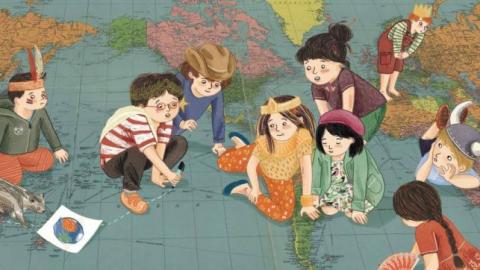Kids, don't mess with God
My attitude toward their religiosity swings between laughter and tears. There’s no doubt that they are a lot more pious than I would want them to be. They’ve been hearing about God since the age of 2 in supposedly secular preschools in central Tel Aviv. God is an Israeli consensus. They’re not sure he exists, but they’re unwilling to consider that he doesn’t. Maybe it’s more convenient to believe in God when you’re a pawn in a world of serious authority figures – notably parents and teachers – with the spirit of God hovering above them all.
In 1925, John Scopes, a schoolteacher in Dayton, Tennessee, was accused of teaching Darwin’s theory of evolution, and in so doing, violating a state law. The ensuing drama is engraved in the collective memory under the heading of the “Scopes Monkey Trial.” Ninety years later, educators still have to think twice before they teach the theory of the origin of species. They have to walk the thin line between religion and science, and avoid a clear-cut explanation that could provoke sensitivities.
No such considerations seem to bother Emuna Elon, the author of “Only When I Close My Eyes: Thoughts about God.” Maybe because she operates from the outset on sensitive side of the barrier. Here’s her message to the children of Israel: “I came from Mom and Dad / And they came from Grandma and Grandpa / And they – from their mom and dad. / And the first mom and dad? / They came from God.”
Let’s say that after a quick perusal I decide to buy or borrow this book for my children, captivated by Noa Kelner’s lovely, warm illustrations and the polished design of Sivan Toledo, not suspecting that I am bringing an agenda wrapped in cellophane into the house. I read them the author’s contemplations and the words stick in my craw.
When they hear or read Elon’s new book, their belief in God (or fear of him) will get stronger. That shouldn’t necessarily scare me, but it makes me apprehensive that they will grow up to be less complex and less critical than I would want them to be. This is a book of abstract thoughts posing as pluralistic. “Every child imagines God differently,” the blurb on the book jacket says. “One imagines him as a helicopter hovering in the sky. Another imagines him as a little dwarf. And one girl imagines him as a dog. And what about you?”
Is there an option to reply: “We don’t imagine him at all. We don’t believe in his existence”? Is it legitimate for parents in the Israel of 2015 to raise their children as atheists? Not even in the State of Tel Aviv is the answer clear-cut.
Elon plays tricks on the young readers, but not on their parents. Sometimes she sounds almost Buddhist (“Only by closing your eyes / and looking deep within / is it possible / sometimes / to see God”). But then she launches a powerful blow with lines such as, “God knows / what will happen to me tomorrow. / He knows what I will do / and knows what I will choose.” In other words, everything is already determined and everything happens according to his will. So does it make a difference, what we choose to do?
Kelner’s illustrations are meant to soften the message, along with this text as with all the others. Children are playing hide-and-seek, faces that are supposed to represent God are looking at them from a tree. He sees who will win and who will lose, in this game and in the game of life. But the delightful drawings cannot camouflage a blunt message. They only make it easier to swallow.
Against the backdrop of another illustration, in which a mother washes dishes and glances at her cellphone, but definitely not at her son, Elon writes, “Busy parents / don’t always find time / to listen to the words of a little boy. / But God, / who crowns kings / and gathers outcasts / and arranges the stars / who destroys and builds worlds endlessly / always has time / to look at me, too. / And when I turn to him / he listens to my words.” God is a bit busier than you, Elon scolds the preoccupied mother, but he has time to listen to your child.
The author’s God is “scarier and stronger” than robbers, monsters and enemies. He sees me “even when I hide.” He “knows, even without my telling, how regretful I am and how sorry.” He lies in wait for “the most wicked of the wicked, the biggest sinner.”
In short, kids, don’t mess with him.
Maya Levin

